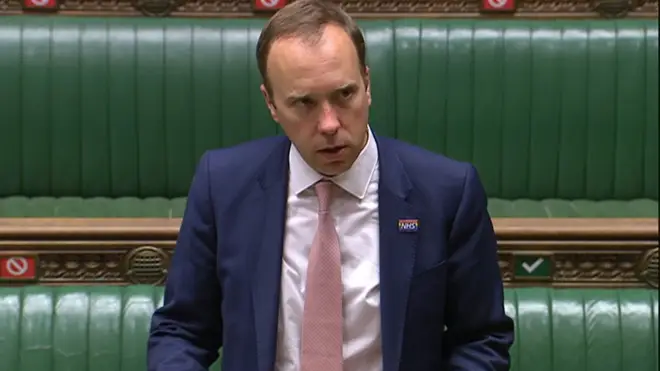
Ben Kentish 10pm - 4am
18 September 2020, 07:32 | Updated: 18 September 2020, 08:46

Matt Hancock has refused to rule out two-week lockdown
Matt Hancock has said the possibility of a new national lockdown would be 'the last line of defence' against coronavirus.
The health secretary said on Friday the government would take "the action that is necessary" to control COVID-19, but would avoid imposing strict blanket restrictions if possible.
However, he did not rule out the possibility of the measure being brought in.
He told LBC: "The last line of defence is a national lockdown [...] a local lockdown is a tool in our armoury."
READ MORE: Nick Ferrari: Time to follow Sweden's lead and free up our economy

Mr Hancock's remarks come amid reports the government is planning a two-week national lockdown to coincide with the October half term.
Scientists on the government's Scientific Advisory Group for Emergencies (SAGE) and the Scientific Pandemic Influenza Group on Modelling (Spi-m) proposed the move on Thursday, saying such timing would create minimal disruption to schools.
READ MORE: 10 million people in lockdown in UK as North East restrictions come into effect
"I understand we are at a very serious moment," Mr Hancock told LBC's Nick Ferrari, as he admitted there had been an "acceleration" in the number of cases.
Refusing to rule out the possibility of a second lockdown, he added that he wanted to "avoid" it, but the way around doing so would be by "following the rules".
"The rule of six, we've made it really simple so everybody can understand it," he said.

"Why is test and trace such a bloody shambles?" Nick Ferrari asks Matt Hancock
Earlier this week, Boris Johnson said another national lockdown would be "disastrous" for the economy.
Facing MPs at the Commons Liaison Committee, the prime minister said he thought second period of strict stay-at-home measures would be "completely wrong" for the country and that the government would do "everything in our power" to prevent it.
He added: "And can we afford it? I very much doubt that the financial consequences would be anything but disastrous, but we have to make sure that we defeat the disease by the means that we have set out.
"So when I see people arguing against the rule of six or saying that the government is coming in too hard on individual liberties and so on - I totally understand that and I sympathise with that, but we must, must defeat this disease."
READ MORE: Restrictions on care home visits to be imposed as part of winter plan
On Thursday, a further 3,395 people tested positive for COVID-19, which is among one of the highest daily figures since mid-May.
Restrictions were also reimposed on parts of north east England - specifically an area home to 2 million people - where household meetings have now been banned, and leisure venues are forced to close by 10pm.
It brings the total number of people currently living under extra restrictions in the UK to more than 10 million, with rules imposed across Scotland, south Wales, the north west, Yorkshire and the Midlands.
Lancashire is next on the list of places expected to receive a tightening of measures.
READ MORE: Lancashire expected to face lockdown measures after rise in cases

"Test and trace will be one of the main topics at any public enquiry."
Meanwhile, the government is also in the midst of a turbulent week as it faces criticism over the efficiency of the test and trace system.
Reports in recent days have revealed the system is buckling under demand, forcing the government to admit plans to ration and prioritise tests for those who need them most.
"I, of course, accept there are challenges because demand has shot up," Mr Hancock told Ferrari on Friday morning in defence of the system.
"Any system where we're providing something for free, of course you have to prioritise [...]
"There is support across the board for prioritisation."